Reviewing "A Room With A View": Analyzing Text and Film
Don't wanna be here? Send us removal request.
Text
An Analysis of Text and Film: A Room with a View
A Room With a View by E. M. Forster is a novel focused on a cast of characters living in the Edwardian era of Great Britain, stifled by society’s expectations and longing to break free. I interpreted the film A Room With a View as a satirical comedy of the British class system focusing on the message, to live life, you must seize your passion.
I really enjoyed A Room With A View by E.M Forster, and the film “A Room with a View” is a literal translation of the text.

2 notes
·
View notes
Photo
“...if Miss Honeychurch ever takes to live as she plays, it will be very exciting both for us and for her...” (Forster Ch. III)
The scenes that take place in Italy are beautiful - the colors are pastel, soft and gentle. Many shots above look almost like paintings. In the film it is obvious that Italy is a place of passion.
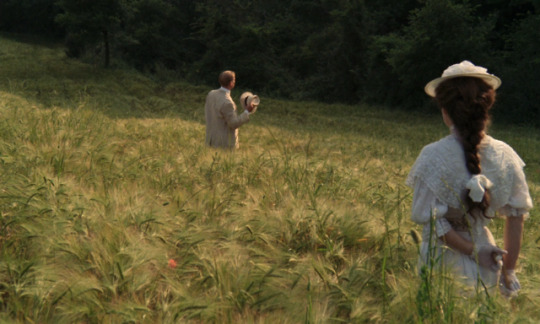


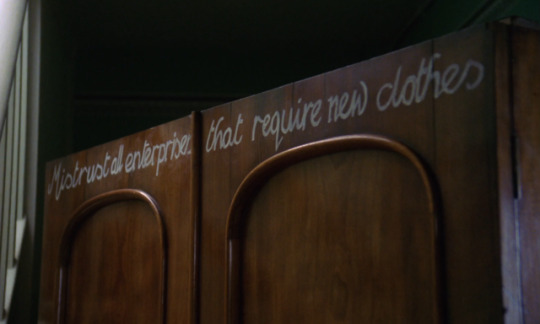
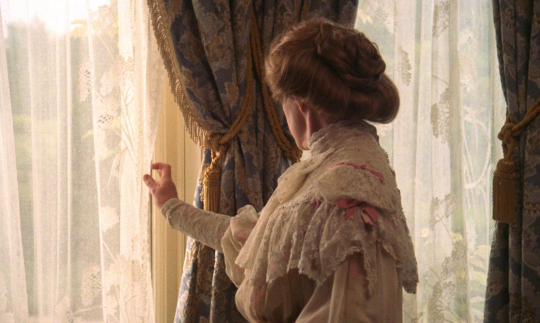
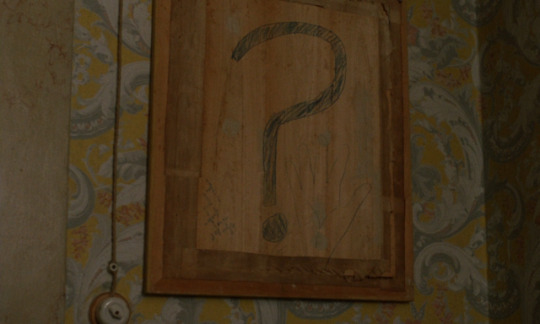
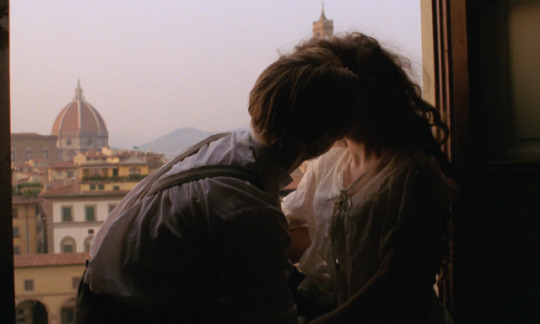
13K notes
·
View notes
Photo
Both film and text introduce us to Lucy Honeychurch in Italy. Setting greatly affects character, and because Lucy is surrounded by passion, it starts to change her. Because of Italy, Lucy engages with George Emerson and his father and enjoys their change in perspective from the rest of the company she keeps.
Both reader and viewer do not know that this is a shift in her perspective - we are simply introduced to Lucy in this mindset.

8K notes
·
View notes
Photo
Mr. Beebe supports Lucy’s passion, and is very surprised to hear she will be spending her life with such an intellectual, stingy man. This was one of my favorite scenes in the movie -- the look on Beebe’s face as Cecil breaks the news of his engagement is perfect. Who would want to marry Cecil Vyse?
Cecil is the complete opposite of George, and manipulates Lucy’s character once she returns to England and closing herself off from passion. Because he has been so heavily influenced by British society, Cecil realizes Lucy is different from others. Her passion for life draws him to her.




46 notes
·
View notes
Photo
George wants to live a meaningful life and is constantly questioning the world around him, as seen by the question marks he continuously makes that appear in the beginning of the film.
Because Lucy and George meet in Italy, their relationship is different from any other. Lucy understands the social repercussions of being involved with him. Because of Charlotte’s influence on her, she withdraws from her passion for life, and tries to fit the upper class British standard of being an intellectual, withdrawn woman.








3K notes
·
View notes
Photo






A Room with a View (1985) dir. James Ivory
853 notes
·
View notes
Text
“if Miss Honeychurch ever takes to live as she plays, it will be very exciting both for us and for her.” (Forster, Ch. III)

By Mr. Beebe’s statement, the reader understands Lucy has great passion within her. Why does she hide it? Britain’s stifling views of what a woman should be keeps Lucy from becoming her true self. A woman must be respectable, intelligent, quiet, and refrain from experiencing joy.
1 note
·
View note
Quote
She had deemed it unwise to reveal her soul.
E. M. Forster, A Room With a View (via antigonick)
Lucy understands the repercussions of giving into her passions, to live life fully like George Emerson, and to shed the weight societal customs have put on her shoulders. Fear holds Lucy back.
2K notes
·
View notes
Photo
When Lucy and George kiss, Charlotte is appalled and views the event as being unfortunate, which causes Lucy to completely shut down. Lucy recognizes that passion is frowned upon and in turn she begins to frown upon those who are passionate.
Taking place in the Italian countryside, Lucy and George are outside of society’s range--they are away from the city and the rest of their party in the field. Surrounded by nature, human nature takes hold of Lucy as she gives into passion.



2K notes
·
View notes
Photo
The audience is introduced to the English setting through the scene between Mrs. Honeychurch and Freddy, which consists of small talk and gossip over Cecil and Lucy’s engagement. Britain is a place of gossip, of social hierarchy, and of wanting social status to be as high as possible.

70 notes
·
View notes
Photo
In adherence to society’s norms, Lucy decides to marry Cecil. Cecil’s attitude rubs off on Lucy, and her nose also begins to turn up at everything she once was fond of. Intellect begins to stifle her character and she becomes one of her worst nightmares—her cousin Charlotte. While reading the novel I was struck by this revelation—something had happened to Lucy in which she was no longer herself. Her demeanor and manners change completely after cutting herself off from her feelings toward George, which readers realize when she decides she must be a woman “who care(s) for liberty and not for men” (Forster Ch. XVII). Lucy takes shielding herself from passion so far as to deceive all of those she cares about when lying about needing to visit Greece.




35 notes
·
View notes
Photo
Although lower class, the Emerson’s speak their minds and remind other characters of the importance of passion. Mr. Emerson asks for the Italian carriage driver and his girl not to be broken up, because love is one of the strongest powers in the universe. The other British characters frown upon this notion, and kick the woman out of the carriage, making her walk home.


177 notes
·
View notes
Photo
The British characters frown upon the Emerson’s because their values differ from upper class Britain—the Emerson’s seek passion.
The Emerson’s first offer their room with a view to Lucy and Charlotte, going against what is considered proper, and wanting to please everyone involved. The reader and viewer understand the Emerson’s deal with life differently from the other characters.


66 notes
·
View notes
Photo
Charlotte refuses to step out of society’s boundaries and as a result is constantly complaining and unhappy because she is stifled by her own life. Having never experienced passion, she tries to protect Lucy from it, thinking it as an enemy of society.
Charlotte represents British class norms, while Lucy battles throughout both text and film with following Charlotte and deceiving her wishes.

234 notes
·
View notes
Quote
She had deemed it unwise to reveal her soul.
E. M. Forster, A Room With a View (via antigonick)
By over exaggerating the values each character holds dear minus Lucy, who constantly battles between intellect and passion, Forster highlights the faults of social classes.
2K notes
·
View notes
Photo


8K notes
·
View notes
Text
Escaping to Italy
The main difference between the film and literature are the endings—which were the most important in my mind. In the film, Lucy escapes to Italy with George and embraces her passion for life, seemingly without consequences. In the novel, she escapes Britain but alienates herself completely to her home, her family, and her friends due to her lies.
British society punishes Lucy for embracing her passion, which comments on the harsh consequences that comes with betraying Britain’s class system. Obtaining happiness should be the goal for members in a society—and isolation caused by seeking passion over intellect seems unfair today. No matter your social status, love should conquer all.
3 notes
·
View notes